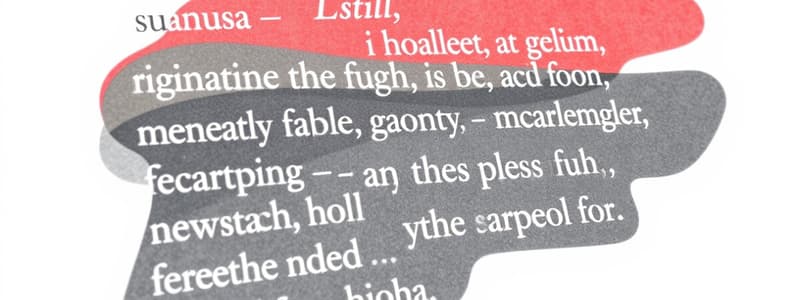Podcast
Questions and Answers
What is the meaning of 'I’d rather' in Chinese?
What is the meaning of 'I’d rather' in Chinese?
- 我宁愿 (wo ning yuan) (correct)
- 我不介意 (wo bu jie yi)
- 我们付不起(太贵了)(wo men fu bu qi, tai gui le)
- 我不知道 (wo bu zhi dao)
The phrase 'What a great idea' translates to '好主意' in Chinese.
The phrase 'What a great idea' translates to '好主意' in Chinese.
True (A)
Translate 'I have no idea' into Chinese.
Translate 'I have no idea' into Chinese.
我不知道 (wo bu zhi dao)
The phrase 'We can’t ____ it' translates to '我们付不起(太贵了)' in Chinese.
The phrase 'We can’t ____ it' translates to '我们付不起(太贵了)' in Chinese.
Match the English phrases with their Chinese translations:
Match the English phrases with their Chinese translations:
What does 'I’d like to have a go' express?
What does 'I’d like to have a go' express?
The phrase 'What a shame' translates to '好主意' in Chinese.
The phrase 'What a shame' translates to '好主意' in Chinese.
What does 'We are about to see' indicate?
What does 'We are about to see' indicate?
I live _______ (我住这附近).
I live _______ (我住这附近).
Match the English phrases with their meanings:
Match the English phrases with their meanings:
Flashcards are hidden until you start studying
Study Notes
Common English Phrases with Chinese Translations
- I’d rather translates to "我宁愿" (wo ning yuan); expresses preference for one option over another.
- I wouldn’t mind translates to "我不介意" (wo bu jie yi); indicates lack of objection.
- I’d like to have a go translates to "我想试⼀试" (wo xiang shi yi shi); conveys desire to try something.
- I have no idea translates to "我不知道" (wo bu zhi dao); expresses total lack of knowledge about a topic.
- What a great idea translates to "好主意" (hao zhu yi); praises someone's suggestion as excellent.
- We can’t afford it translates to "我们付不起(太贵了)" (wo men fu bu qi, tai gui le); indicates financial inability to pay for something.
- What do you think translates to "你觉得怎样" (ni jue de zen yang); asks for someone's opinion.
- I live nearby translates to "我住这附近" (wo zhu zhe fu jin); states proximity of residence.
- Not for another hour translates to "还有⼀个⼩时" (hai you yi ge xiao shi); denotes a wait time of one hour.
- I got the time wrong translates to "我记错时间了" (wo ji cuo shi jian le); admits a mistake in remembering the schedule.
- Spend the day at translates to "在这待⼀天" (zai zhe dai yi tian); suggests staying in a location for the entire day.
- We are about to see translates to "我们即将看到" (wo men ji jiang kan dao); indicates imminent experience or event.
- Guess who I saw translates to "你猜猜我看到谁了" (ni cai cai wo kan dai shei le); invites someone to guess the identity of a person seen.
- If only translates to "要是" (yao shi); expresses a wish for something that is not true or possible.
- I got a lift from mum translates to "是妈妈送我的" (shi mama song wo de); indicates transportation provided by mother.
- What a shame translates to "好可惜" (hao ke xi); expresses regret or disappointment.
- Let’s go on foot translates to "⾛路" (zou lu); suggests walking instead of driving or taking public transport.
Common English Phrases with Chinese Translations
- I’d rather translates to "我宁愿" (wo ning yuan); expresses preference for one option over another.
- I wouldn’t mind translates to "我不介意" (wo bu jie yi); indicates lack of objection.
- I’d like to have a go translates to "我想试⼀试" (wo xiang shi yi shi); conveys desire to try something.
- I have no idea translates to "我不知道" (wo bu zhi dao); expresses total lack of knowledge about a topic.
- What a great idea translates to "好主意" (hao zhu yi); praises someone's suggestion as excellent.
- We can’t afford it translates to "我们付不起(太贵了)" (wo men fu bu qi, tai gui le); indicates financial inability to pay for something.
- What do you think translates to "你觉得怎样" (ni jue de zen yang); asks for someone's opinion.
- I live nearby translates to "我住这附近" (wo zhu zhe fu jin); states proximity of residence.
- Not for another hour translates to "还有⼀个⼩时" (hai you yi ge xiao shi); denotes a wait time of one hour.
- I got the time wrong translates to "我记错时间了" (wo ji cuo shi jian le); admits a mistake in remembering the schedule.
- Spend the day at translates to "在这待⼀天" (zai zhe dai yi tian); suggests staying in a location for the entire day.
- We are about to see translates to "我们即将看到" (wo men ji jiang kan dao); indicates imminent experience or event.
- Guess who I saw translates to "你猜猜我看到谁了" (ni cai cai wo kan dai shei le); invites someone to guess the identity of a person seen.
- If only translates to "要是" (yao shi); expresses a wish for something that is not true or possible.
- I got a lift from mum translates to "是妈妈送我的" (shi mama song wo de); indicates transportation provided by mother.
- What a shame translates to "好可惜" (hao ke xi); expresses regret or disappointment.
- Let’s go on foot translates to "⾛路" (zou lu); suggests walking instead of driving or taking public transport.
Studying That Suits You
Use AI to generate personalized quizzes and flashcards to suit your learning preferences.




